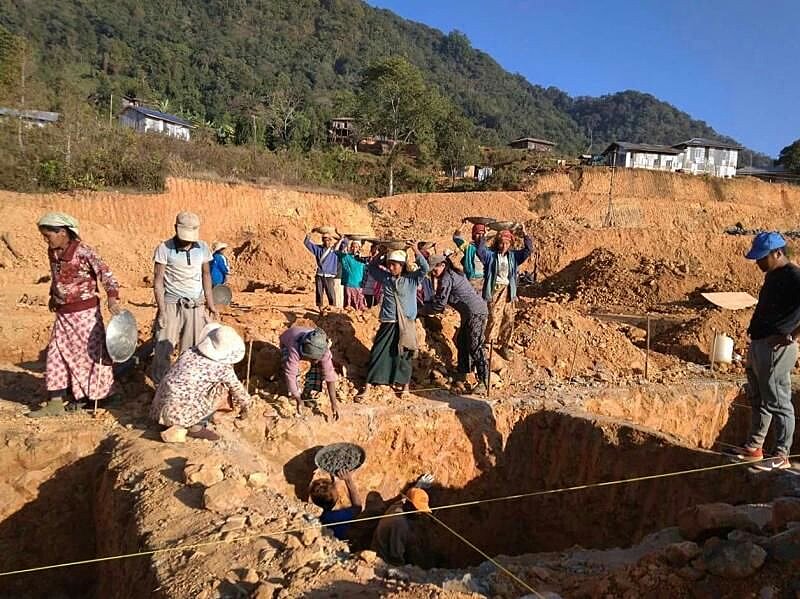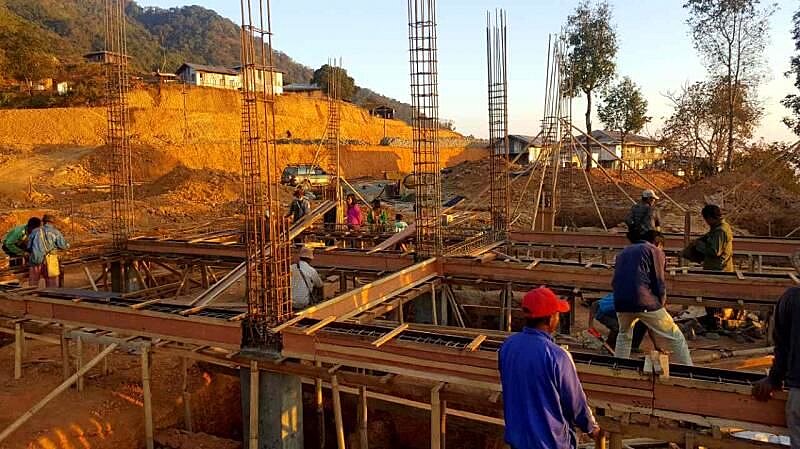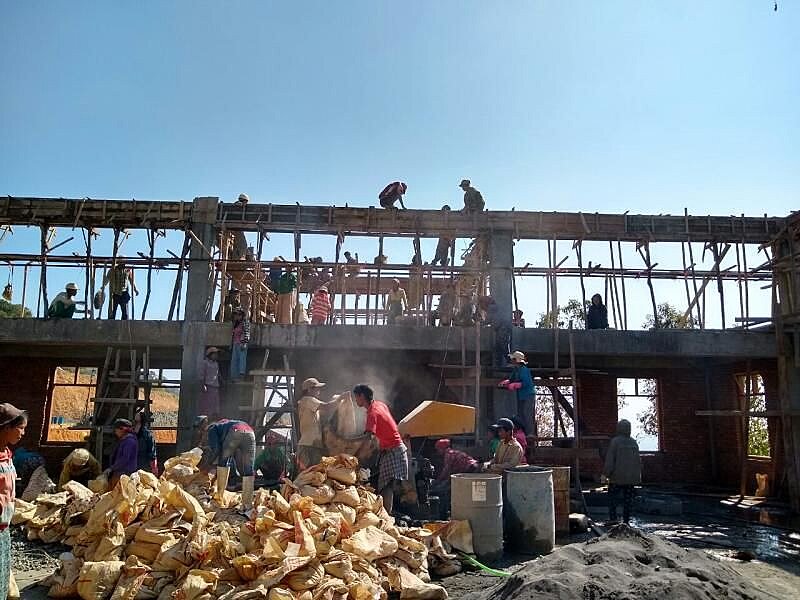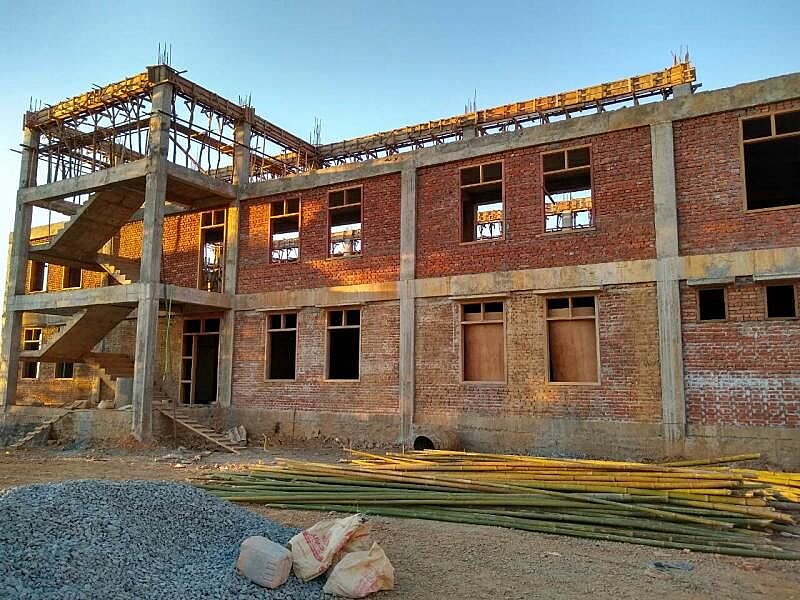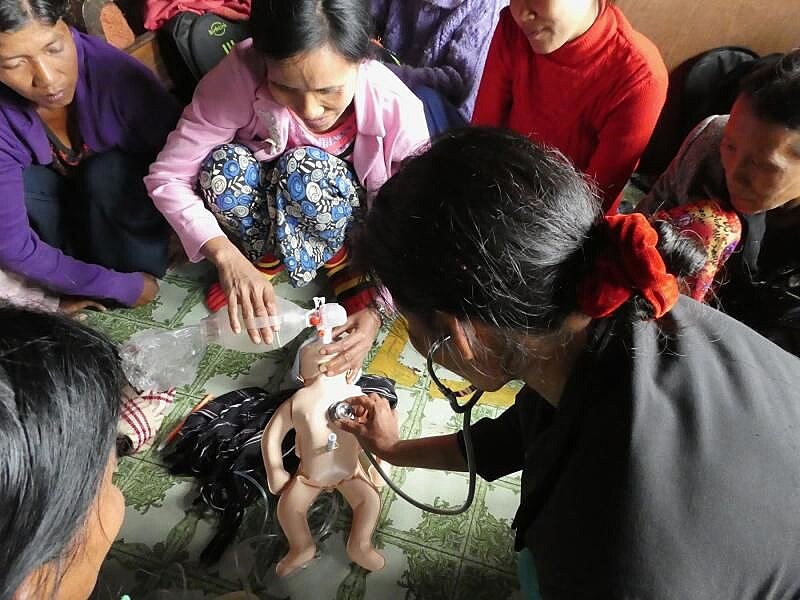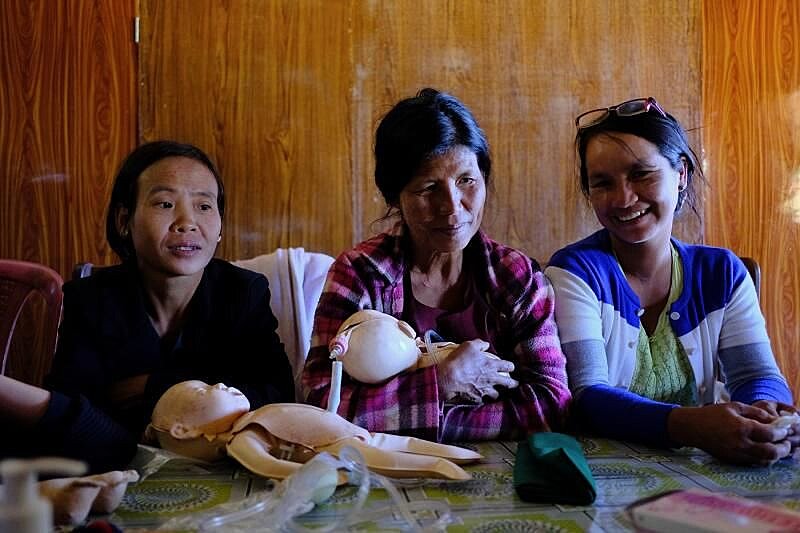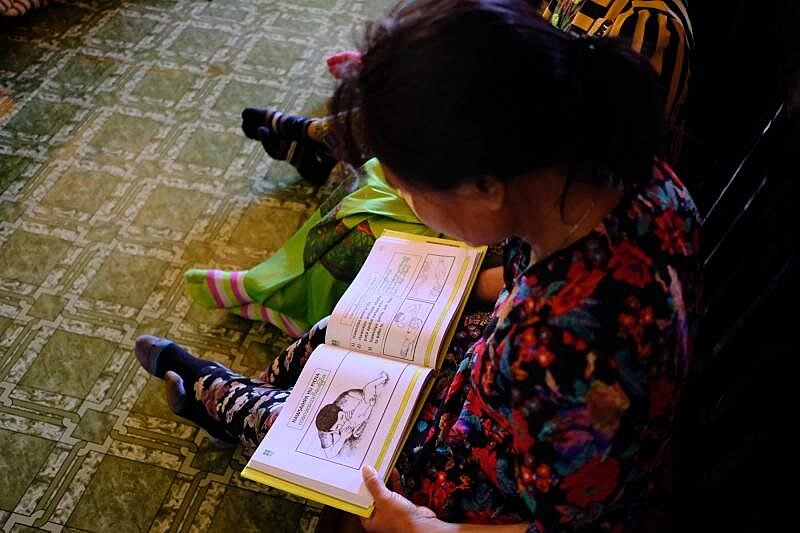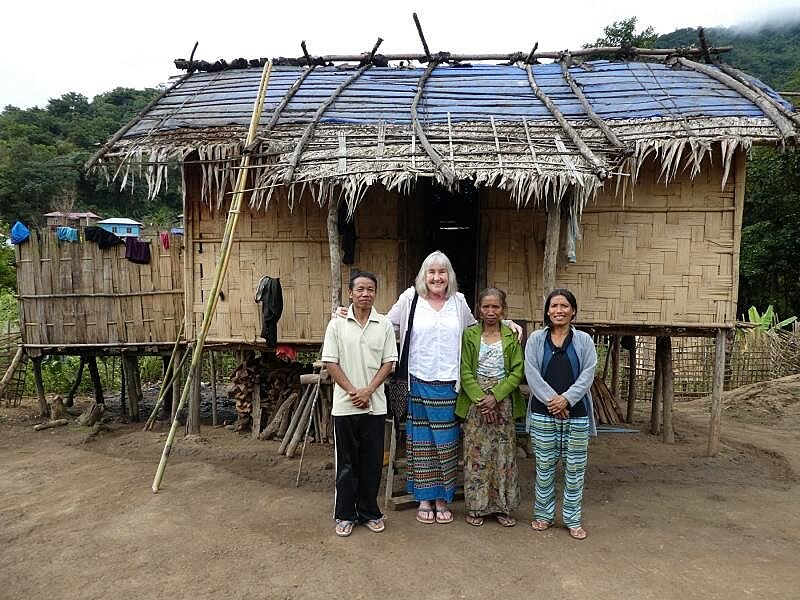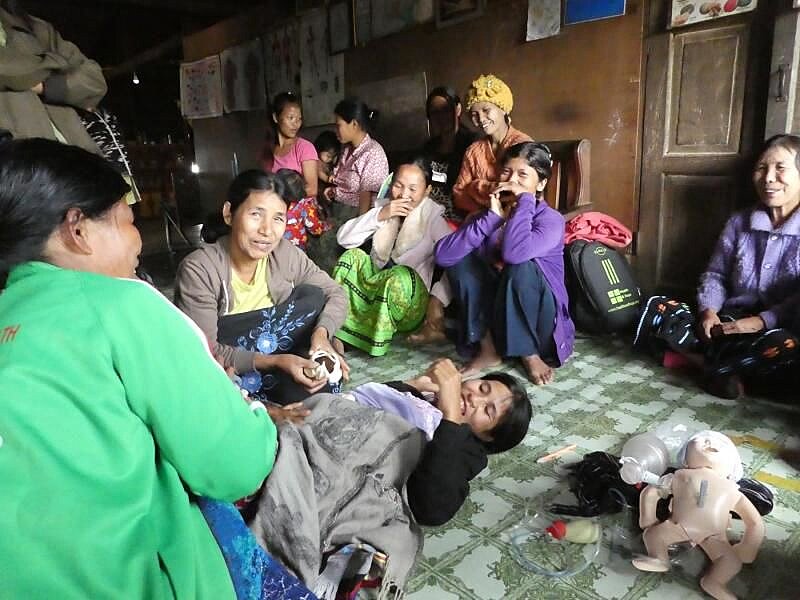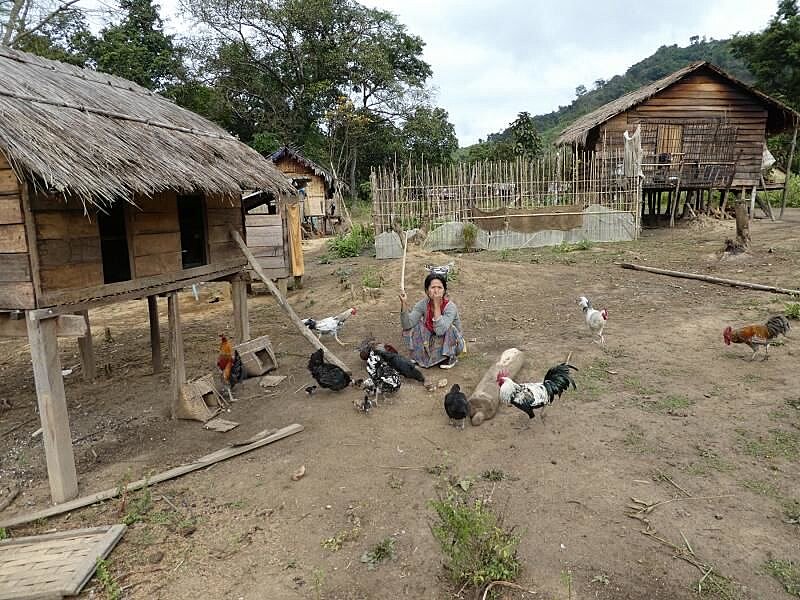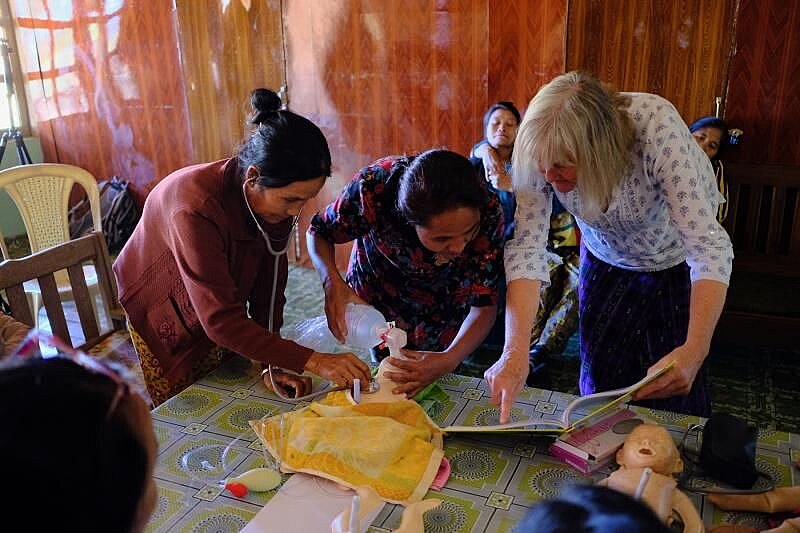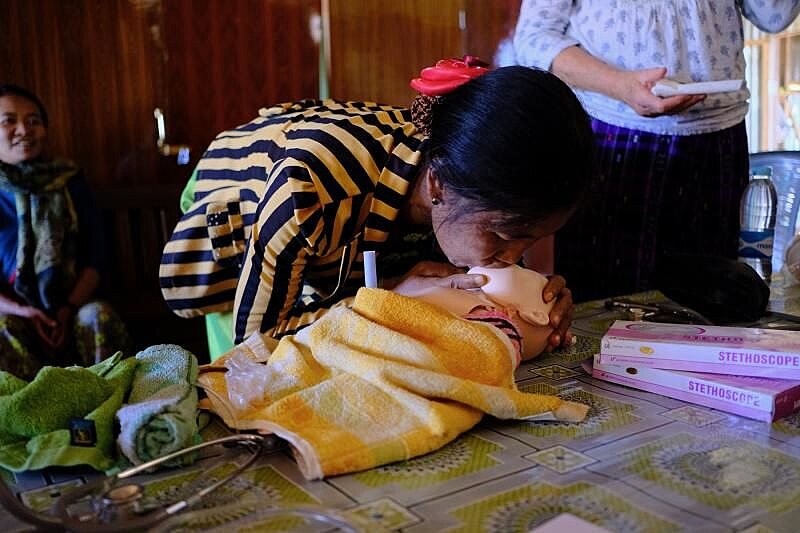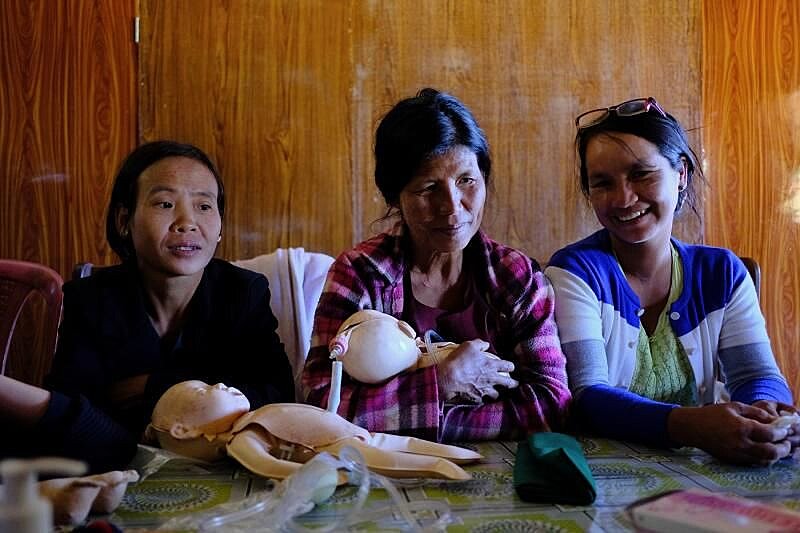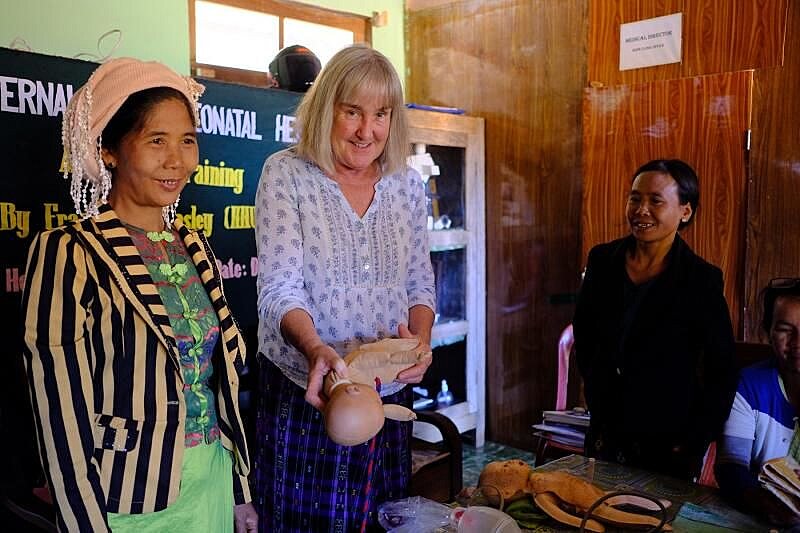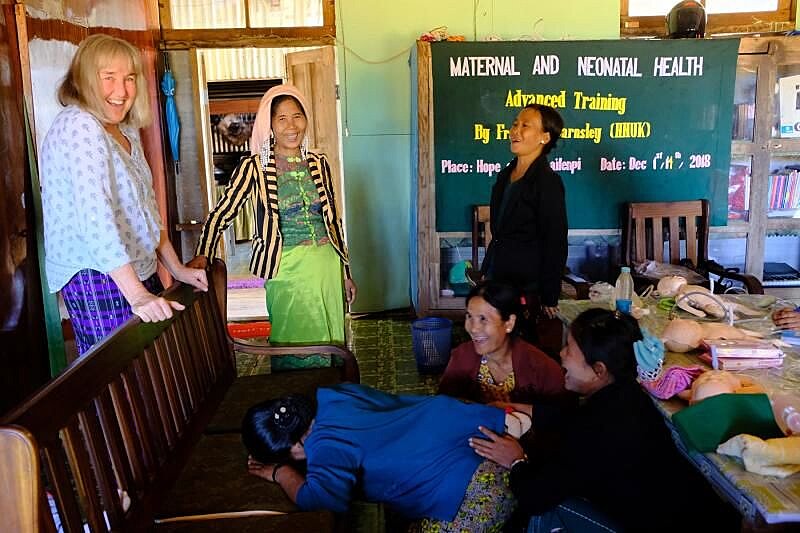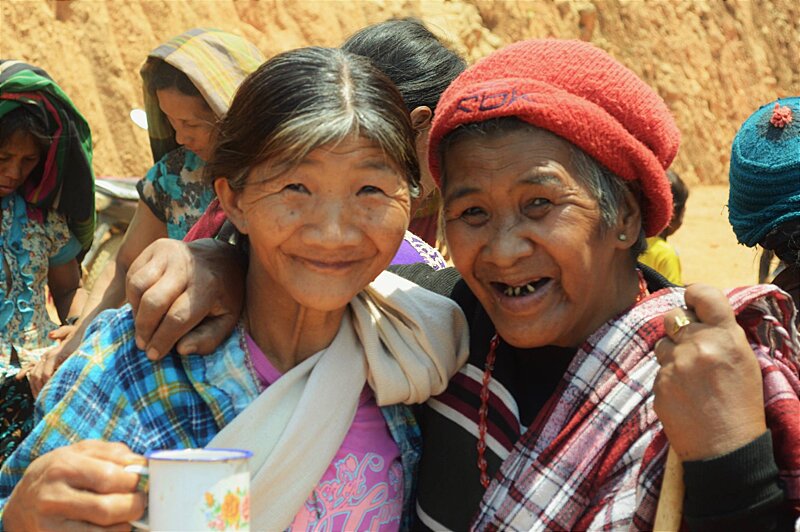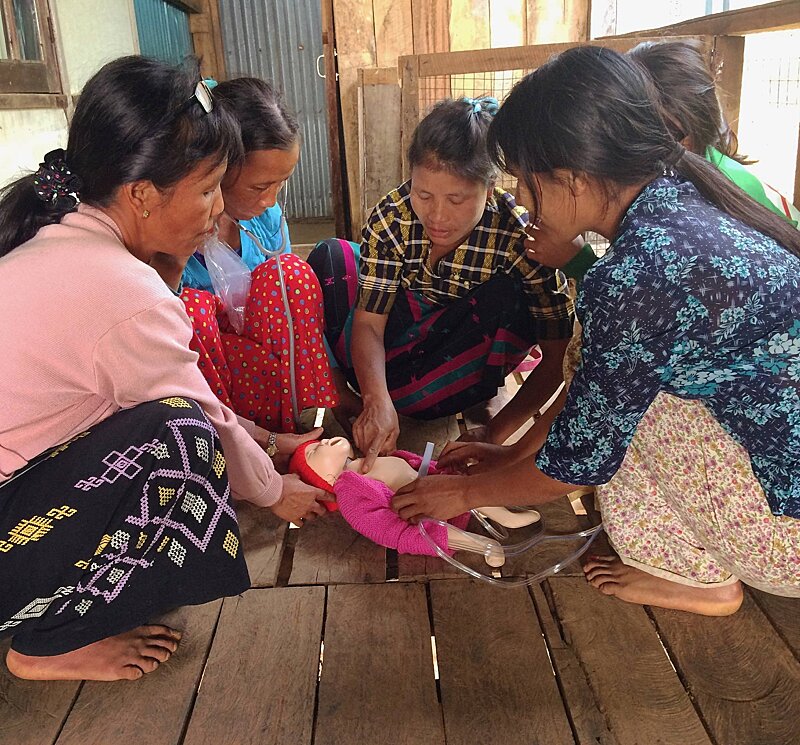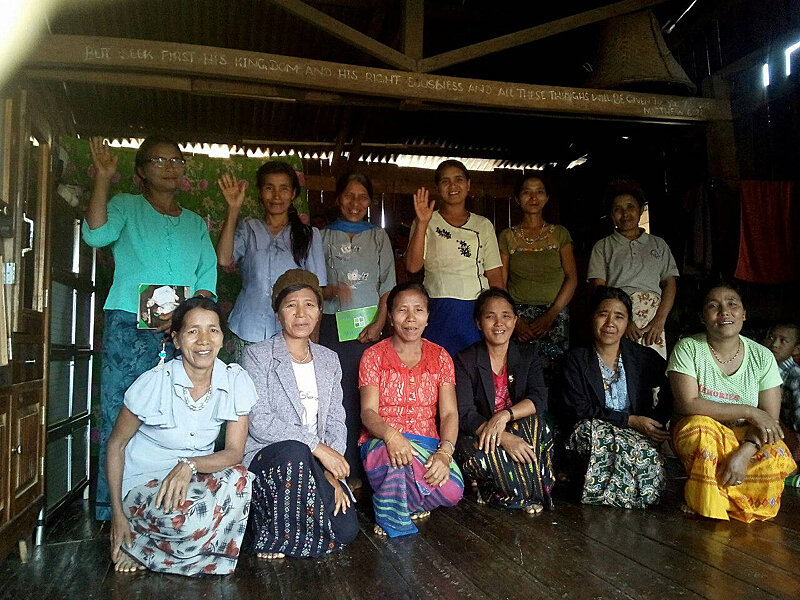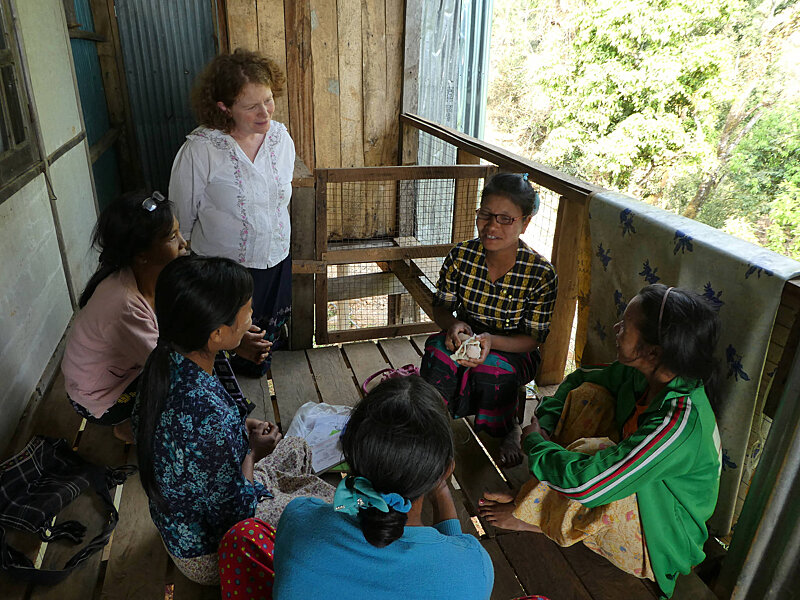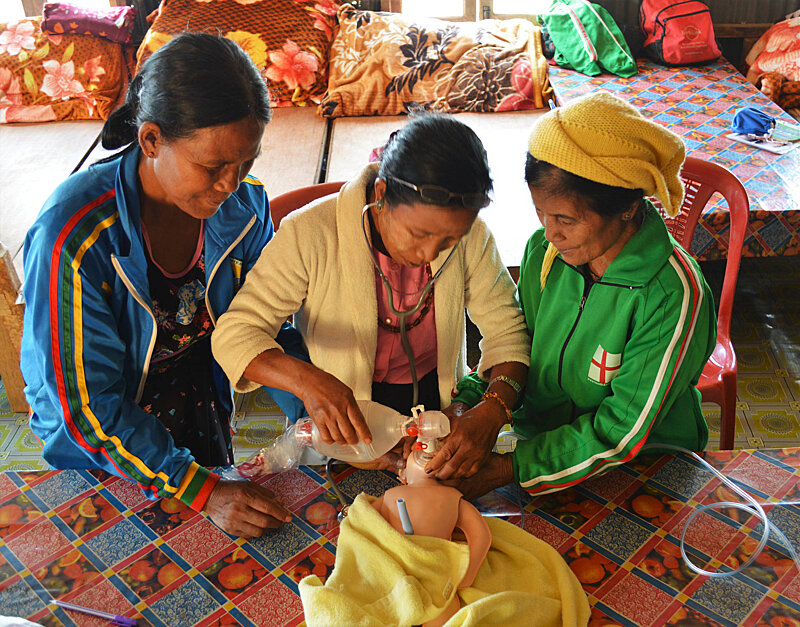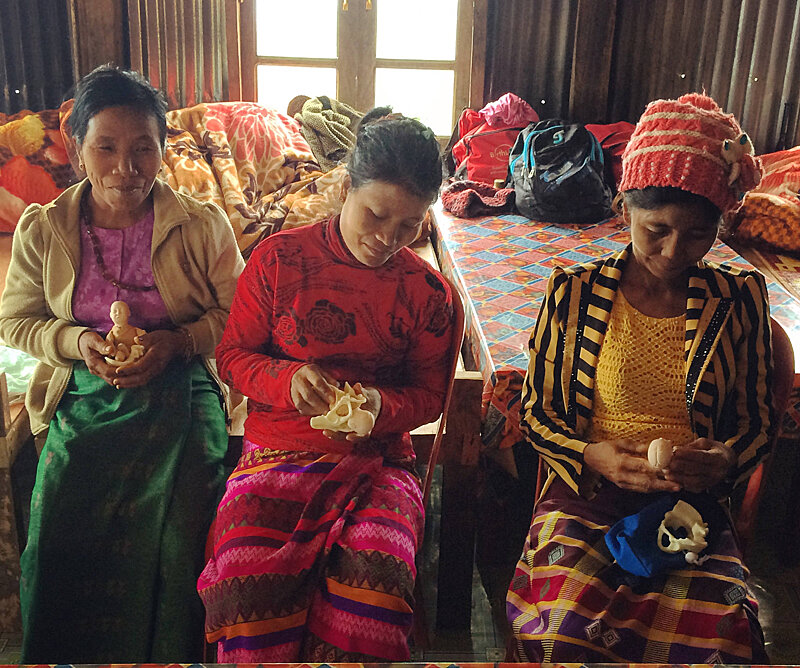Latest news
Rebuilding the training centre: The final stretch
Posted on 28th February 2019 by Chris Jones
On 30th May 2017, Cyclone Mora made landfall in Bangladesh before moving northwards through western Myanmar. Torrential rain and high winds destroyed homes and triggered landslides in rural villages with 37 families made homeless in the village of Lailenpi where Health and Hope Myanmar’s (HHM) work is based.
In addition, we were devastated to lose the majority of the HHM training centre; seven buildings were destroyed including the main training hall, kitchen and dining area and four dormitory buildings.
Over 18 months later, it's incredible to look back and see how much progress has been made on the building of the training centre post Cyclone Mora.
When the project started, the local tradesmen initially refused to dig foundations at 20' spans, asking us to hire 'professional builders' from outside the village. They had never dreamed of being able to construct a building of this scale, nor did they feel they had the skills to do it. But through the provision of field engineers and through careful supervision and encouragement, the training centre is now really starting to take shape. Best of all, the local townspeople can look back at what they have accomplished with their own hands, standing tall and proud of their accomplishments.
We’re delighted that the building is now almost complete and that we’ve just received a significant grant for the last stage of work to put the roof on the building. In fact, a few weeks ago we hosted our first week long training in the building, despite the fact that it has no roof, or even a coat of paint on the walls! In December, 28 Area Coordinators, who provide in-situ support for our network of Community Health Workers, gathered for the launch of our new healthcare project and took up residence in the training centre. This has been followed by training for educators in January, and fuurther training of health workers in February.
Latest update on maternal and neonatal health project
Posted on 31st January 2019 by Chris Jones
It was a delight to accompany one of our specialist midwifes from the UK, Frances Barnsely, on her seventh visit to Myanmar (Burma) in December 2018.
We have been running Traditional Birth Attendant (TBA) training since 2013 from our base in Lailenpi, nestled in the jungles of western Chin State. As a result, many lives have been saved, with the local under-5 orphanage closing down in March 2018 thanks to the reduction in maternal deaths during childbirth.
With 166 women having received at least two trainings covering basic and advanced topics over the five prior years, there were now geographic challenges in reaching the more remote villages. To put this in context, some of the women had previously walked 5-6 days to participate in the week long training course, and on top of the return journey, it was proving too difficult to ask them to spend up to three weeks away from their families.
As such, at the beginning of 2018, we brought seven of the most experienced women together to take on new roles as local trainers. Each of the trainers were to visit 2-3 remote villages close to their homes to help expand the reach of the service. Key to the success of this new approach was how effective the local women would be at running their own training courses, in addition to whether they would be accepted in their local communities. With support from the local women's association, the trainers were able to deliver training to 91 new TBAs covering ten core topics. In addition, birthing bags and clean delivery kits were distributed through the network of trainers.
During our visit, Frances undertook a review of the trainers work through visiting villages on the back of a motorbike. After a gruelling ride over rough mountain tracks, she arranged a three day assessment for the women who had received the local training. In addition, Frances continued to up-skill and update the knowledge and professional practice of the trainers who attend a five day workshop at the Health and Hope clinic.
"I was so surprised how much the local women knew. I had never expected the trainers to be able to deliver so much of the course and so well. There were obviously differences between the villages, however overall, topics such as hand washing and knowledge of diet were excellent. There was still a need to support the women in greater understanding of the mechanisms of birth and they continue to need more practice in emergency drills, but this will come with time.
I think what struck me most was the impact of the training on the women's self-esteem. It was clear how the initiative had raised their status within the village which had a knock on effect on their confidence. Previously they were very insecure, lacking the self-belief that they had the ability to benefit from the training in Lailenpi. However, because they had the opportunity to practice with a local trainer and then meet us in person, they overwhelmingly expressed a deep desire to attend the full training course. The support of their local community is vital for this, and this was confirmed again and again by the village elders.
Overall, there was such excitement and joy in learning together, it was absolutely thrilling to be a part of it!”
Reflections from training Traditional Birth Attendants in Myanmar, Megan Jenkins (Trainee midwife)
Posted on 31st August 2018 by Philippa Wilford
It is a truth universally acknowledged that a country in possession of a high maternal and neonatal death rate, must be in want of more midwives.
Indeed the World Health Organisation has declared that the best investment into healthcare services is in the midwifery workforce since midwives can provide 90% of the essential care needed for women and newborns and contribute towards ending preventable maternal and neonatal deaths.
And yet in many countries women are still dying in childbirth as they have no access to midwives. These women are being denied their basic human rights. The Millennium Development Goals identify midwives as being the cornerstone to improving the health of whole communities, but in the remotest mountain regions of Burma whole communities are born, live, give birth and die without the support of healthcare, hospitals, doctors or the much needed midwives.
Instead these women rely on the bravery and courage of their fellow village women, their Traditional Birth Attendants (TBAs) to safely monitor them through pregnancy, support them to birth their babies and guide them through the fragile early days of motherhood helping them to nourish and sustain their babies. These TBAs provide a lifeline for the most desperate women, and yet many of them are illiterate, uneducated and have received no training. Knowledge, combined with cultural tradition, is passed down through the generations of TBAs and they learn their skills from village elders or their own mothers. Whilst their experience is huge, their knowledge and practice is not evidence based and can be unsafe.
In April 2018 I travelled out to Burma with 2 midwives to deliver a TBA training programme. Four days of travel navigating the almost impassable dramatic mountain passes of Chin State brought us to Lailenpi, a sprawling mountain village clinging to the dusty slopes, deep in the jungle and overlooking the border with India. A village little known to the outside world, 8 hours motorbike journey from Matupi, its closest town, and completely isolated during the 6 months of monsoon season. And yet the village was entirely alive with a vibrant Christian community (rare in Buddhist Burma), all eagerly awaiting our arrival.
Our work was orchestrated through the charity ‘Health and Hope’, founded by Dr SaSa. Born and raised in Lailenpi, through famine and poverty, Dr SaSa managed to escape military rule to gain an education in India and then to Armenia to complete a medical training. He vowed to return to his beloved home village bringing health and hope to his people. His charity has trained hundreds of Community Health Workers from neighbouring villages, and with the help of 2 dedicated midwives from England, over 160 TBAs have now also been trained. It was a great privilege to accompany this trip and assist with the next phase of the programme.
Forty TBAs had gathered in Lailenpi. They had come from 12 different villages. Some of them arriving on the back of motorbikes, some of them walking for several days over the mountains, such was their eagerness to come and be trained by the ‘English midwives’. Dedicated to helping the women of their villages, these TBAs left their families and their farms to come and spend 10 days with us. As I heard their stories and learnt more about their experiences of losing mothers and babies in childbirth it was easy to understand their fear and their desperation to learn the skills we would teach them that will enable them to save lives. Despite the advanced equipment and drugs we are lucky to have at our disposal in maternity units in England, the expertise of a good midwife are founded in knowledge, the use of all our senses and competent manual skills. The most valuable tool we have is knowledge, and this we can share worldwide.
Over the 10 days we delivered a dynamic and interactive series of lessons from education on reproductive health, family planning, protection and prevention of sexually transmitted infections, antenatal health and care of the pregnant woman, postnatal care, recognising the unwell mother or baby and the importance of referral into the healthcare system. Teaching could be as simple as the importance of handwashing for the prevention of the spread of infection, or how to encourage and support upright, active birth to the complexities of managing obstetric emergencies of a shoulder dystocia, a postpartum haemorrhage and neonatal resuscitation. Each lesson was carefully chosen for its potential for impact. We were teaching the skills that transcend language barriers and are transferable across international borders.
As the week unfolded the team of disparate women formed a sisterhood, sharing their experiences of birth and death. Together we laughed and cried and as they saw our respect grow for their extraordinary wealth of experience so their trust in us grew and friendships formed. With mutual appreciation for one another the teaching and learning was powerful. These women are used to learning by rote, not to question, just to accept. By the end of the week they were all probing for answers in order to further understand the anatomy and physiology of birth mechanisms and how their actions could help to prevent morbidity and mortality. Watching the enlightenment on their faces as they grasped a new concept was the best reward we could ever ask for. One TBA said at the end of the training ‘Rote learning is what we have always done. These topics are so great because we can see, hear, touch and ask any questions we want to. The practical sessions are so helpful because you can really imagine and practice.’
To reinforce the expansion and sustainability of our training we piloted a ‘Train the Trainer’ initiative, where 7 returning TBAs, highly experienced, skilled and competent were selected to receive additional training in order to equip them to become the Trainer. This scheme was devised to enable the training to spread to villages that we can’t reach, thereby preventing reliance on outside expertise. Together we discussed the barriers to rolling out their teaching and covered topics from adult learning theories and assessing success of teaching, practicalities of accessing villages during monsoon season, gaining respect from village elders, language and dialect differences and availability of equipment. These 7 Trainers practiced delivering some sessions to small groups of TBAs followed by feedback from the groups. By the end of an intensive programme the Trainers were ready to head out on motorbikes with an action plan and 3 identified rural villages each in which to train even more TBAs. Like the concept ‘light one candle and then let the flame spread’, our work can now have a far greater and more wide reaching impact, hopefully benefiting more women, babies and families. The Trainers were keen to take up their new role, to share their skills and knowledge and raise the safety standards in neighbouring villages. One Trainer said, ‘I want to share the knowledge, I have the heart to travel to other villages. I can combine my knowledge with sharing experiences so that mothers can still be safe in villages where there is no midwife.’ Statistics show childbirth and pregnancy-related complications are the leading causes of death among women in Burma, mainly due to delays in reaching emergency care. Until the government trains enough midwives to reach all the remote villages, trained TBAs offer an effective solution.
The assessments we held at the end of the programme demonstrated to us their acceptance of new theories that break their traditional norms. For example, the TBAs are now confident in facilitating upright birth for a vaginal breech and immediate skin to skin contact at birth between the mother and neonate to aid with thermoregulation, breastfeeding and the complex transition of the neonate to extrauterine life. During the emergency drills the TBAs worked in pairs and together managed a series of complex birth events, encouraging team work and collaboration. We distributed equipment and Clean Delivery Kits (CDKs) which will help provide for basic neonatal resuscitation and a more sanitary birth environment, ensuring at every birth there is soap, gloves, a clean sheet for the mother, a wrap for the baby and a cord clamp, to prevent the use of threads from their skirts as is traditional.
What did we achieve? If the effects of this training reach no further than these 40 women, we know that there now exist 40 women empowered with knowledge and understanding, with skills of communication, team work and the realisation that their contribution to maternal and neonatal health is so greatly valued. One Trainer thanked us for the training saying, ‘Now I have been trained, I have peace, confidence and courage when I face different and difficult things. I have patience to wait rather than rush so the women have a better experience of childbirth. I want to save more mothers and babies and I want other, less experienced TBAs to have the same, so I want to train them.’
Yet we know that this training programme has much greater effect than individual empowerment. Since the TBA training programme launched in 2013 no mother in the town where the project was started has lost her life in childbirth, thanks to the skills that the TBAs have been equipped with. As such they have now closed the under 5’s section of the orphanage in Lailenpi. What greater testament could there be to the power of education, knowledge, midwifery skills and the contribution of TBAs, than the closing of an orphanage?
Close to completing my midwifery training this trip offered an exciting opportunity for me to combine my passion for midwifery and teaching with my love for travel. It has also opened a window onto the ways I can continue with voluntary midwifery work amongst some of the most disadvantaged communities. However, far greater than what we were able to give, was what we gained from living amongst these open and kind women. Received into their homes and lives we became engrained in their culture and traditions. Every night we were visited in our wooden house on stilts by a small group of TBAs bringing us gifts and offerings of eggs from their hens, bananas and papaya fruits, wild honey they had harvested from the jungle, small fish from the river and fabrics they had woven. These people of Chin State, who have very little themselves, were unendingly generous in sharing everything with us, from food to friendship, in order to show their gratitude for what we had come to teach them. The experience was humbling and inspiring and I can’t wait to return to them.

